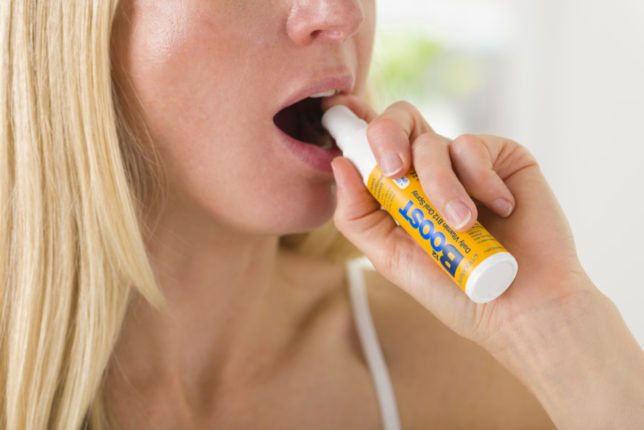SLOAN! spoke to Keeley Berry, Nutritional Expert and New Product Development Executive at BetterYou Ltd, to find out more about B12 and Folate deficiency and how to overcome it.
What are the symptoms of B12 & Folate deficiency?
Vitamin B12 contributes to normal healthy red blood cells, a reduction in tiredness and fatigue and normal homocysteine metabolism.
Vitamin B12 or folate deficiency occurs when a lack of either of the vitamins causes the body to make larger than normal red blood cells that are underdeveloped. This then stops the red blood cells from functioning normally and being able to carry oxygen around the body. Symptoms of this include fatigue, lack of energy, breathlessness, feeling faint, pale skin and headaches to name a few. Other symptoms can develop depending on whether anaemia is caused by low B12 or folate.
Symptoms of a B12 specific deficiency include; sore and red tongue, pins and needles, disturbed vision, a decline in cognition and depression. These symptoms can also occur in those that have not yet developed iron deficiency anaemia. On the other hand, folate deficiency symptoms can manifest themselves as a reduced sense of taste, muscle weakness, depression, numbness and tingling in the hands and feet.

What are the possible causes of deficiency?
B12 deficiencies can be caused by pernicious anaemia – an auto-immune condition that stops parietal cells in the stomach from producing intrinsic factor, leaving your body unable to absorb vitamin B12. Those who have a poor diet, a vegan diet or malabsorption disorders can also be at risk of B12 deficiency due to the low consumption of this vitamin, or because they are unable to absorb nutrients in the intestines. Medications such as proton pump inhibitors, to help stop indigestion, can also interfere with the absorption of B12 from food.
The body is unable to store folate for long periods of time, which is why it’s required daily in our diet. Those that follow an unbalanced or unhealthy diet, misuse alcohol or follow restrictive diets can also run the risk of a folate deficiency. Malabsorption disorders such a coeliac disease can also influence the status of folate within the body. Urinating frequently due to an underlying condition such as liver damage, dialysis and diabetes can cause the body to lose too much folate. During pregnancy, infection and inflammation as well as during blood disorders such as sickle cell anaemia and cancer, the body’s demand for folate is also higher.

What impact can deficiency have on health implications in both the long and short-term?
Complications are rare and tend to occur in those that have been deficient for some time. All types of anaemia can result in heart and lung complications due to a lack of oxygen. More specifically to B12, neurological problems such as vision loss, memory loss, pins and needles and damage to the nervous system can occur and may be irreversible. Infertility can also occur but does tend to be temporary and improves with treatment. It’s also important to consume enough B12 and folate as a lack of both vitamins can cause serious birth defects such as spina bifida. This is because both vitamins are used to help form the neural tube that eventually forms the brain and spinal cord in early pregnancy.
Folate deficiency can increase the risk of cardiovascular disease (CVD), some cancers such as colon cancer, and problems during childbirth such as premature birth and placental abruption. This is where the placenta comes away from wall of the womb and interferes with the nutrient delivery system to the foetus.

How can people combat deficiency?
During pregnancy especially, folate and B12 demand are higher so it’s best to start taking a daily supplement before falling pregnant and for at least the first twelve weeks of pregnancy. There is no harm in consuming past the twelve-week point and could offer protective benefits later into the pregnancy. Eating a varied diet that’s rich in folate and B12 can help to limit deficiency, however, if absorption issues are preventing the uptake of the vitamins, additional supplementation can be useful.
BetterYou™ Boost B12 Oral Spray is an effective aid to normal psychological functions, expertly blended to help boost energy levels. Specially formulated to be absorbed directly into the bloodstream, the tiny droplets of the oral spray absorb quickly in your mouth providing an effective alternative to tablets and capsules by bypassing the digestive system.
Each dosage of 4 measured sprays delivers 1200μg of vitamin B12 along with 40μg of chromium and 0.5mg of green tea extract with a great apricot flavour that makes the spray perfect for those who do not like swallowing tablets and those worried about unpleasant tastes you can experience from certain supplements.
BetterYou Boost B12 Oral Spray is £11.95 available from Holland and Barrett, Ocado, Lloyds Pharmacy, online at www.betteryou.com and all good health stores.
About the expert
 Keeley Berry is the Nutritional Expert and NPD Executive at BetterYou. Keeley studied Biomedical Science at Sheffield Hallam University before starting her career as a Molecular Biologist, testing food products for the top 14 allergens to ensure they complied with EU law regulation and safety. Keeley is now a member of the new product development department at natural health company BetterYou, developing new and innovative VMS supplements for the brand.
Keeley Berry is the Nutritional Expert and NPD Executive at BetterYou. Keeley studied Biomedical Science at Sheffield Hallam University before starting her career as a Molecular Biologist, testing food products for the top 14 allergens to ensure they complied with EU law regulation and safety. Keeley is now a member of the new product development department at natural health company BetterYou, developing new and innovative VMS supplements for the brand.

